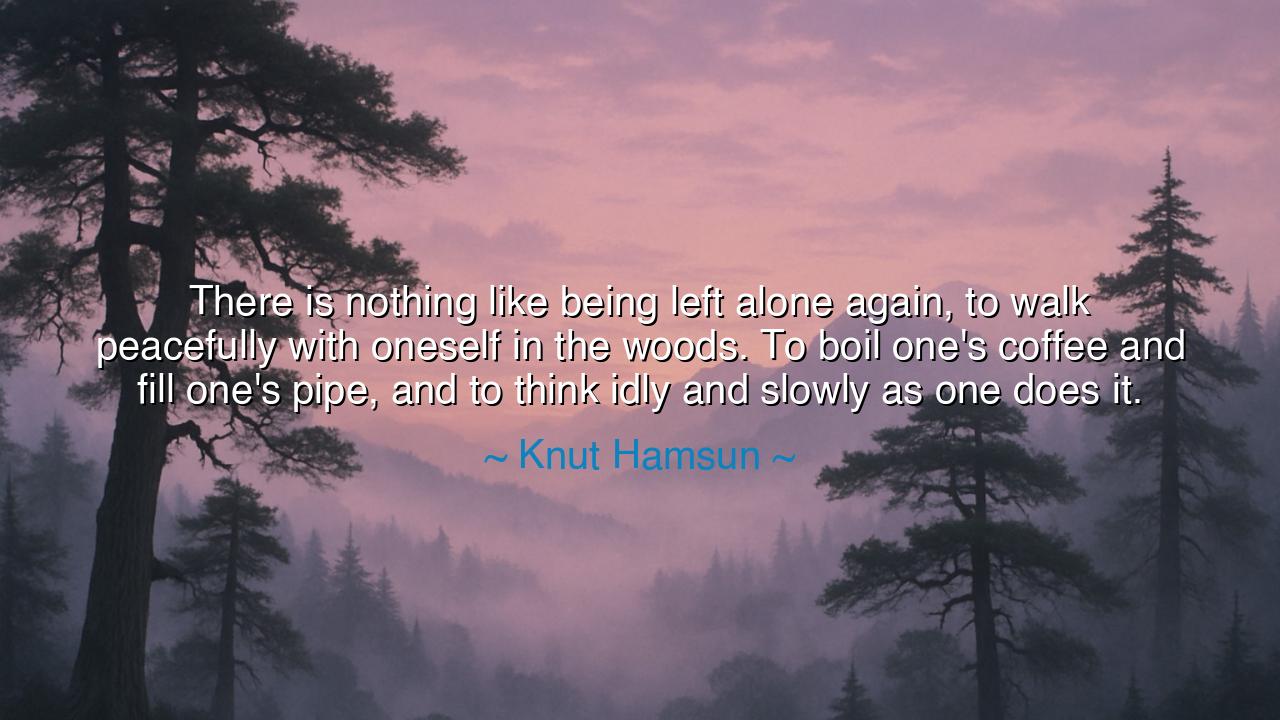
There is nothing like being left alone again, to walk peacefully
There is nothing like being left alone again, to walk peacefully with oneself in the woods. To boil one's coffee and fill one's pipe, and to think idly and slowly as one does it.






In the tranquil and reflective words of Knut Hamsun, he wrote: “There is nothing like being left alone again, to walk peacefully with oneself in the woods. To boil one's coffee and fill one's pipe, and to think idly and slowly as one does it.” Here, the Norwegian master of solitude speaks to one of the oldest longings of the human spirit — the yearning to return to silence, to step away from the tumult of society and rediscover the quiet company of one’s own soul. Hamsun’s words, though simple, carry the weight of ancient wisdom: that peace is not found in the noise of accomplishment or the company of crowds, but in the slow rhythm of nature and the humble rituals of solitude.
When Hamsun speaks of being “left alone again,” he reveals both relief and reverence. To him, aloneness is not exile but restoration — a return to the original harmony between man and the earth. The woods are not empty; they are full of whispers and presence, the gentle murmur of a world that needs no words. To walk peacefully with oneself is to make peace with one’s own thoughts, to hear the sound of the inner voice that is so often drowned out by the demands of others. In the simple acts of boiling coffee and filling a pipe, Hamsun finds a sacred rhythm — the slow and deliberate gestures that reconnect him to the world’s quiet order.
The origin of this reflection comes from Hamsun’s lifelong relationship with solitude and the natural world. Born in 1859 in rural Norway, he grew up in the vast silence of forests and fjords, where life was shaped by the seasons rather than by clocks. Even after fame came to him — after he became one of the most celebrated writers in Europe and later a Nobel laureate — he sought refuge in isolation, fleeing to the woods to escape what he called “the disease of modern life.” To Hamsun, civilization was a labyrinth of noise and false desires; the wilderness, by contrast, was pure truth. His novels, from Pan to Growth of the Soil, are hymns to the beauty of simple living and the profound wisdom of solitude.
There is an echo of the ancient sages in his words. Henry David Thoreau, too, withdrew to the woods at Walden Pond to learn what it meant to live deliberately — to “front only the essential facts of life.” Like Thoreau, Hamsun understood that the forest teaches a language older than human speech, a language spoken by wind and leaf, by fire and smoke. In solitude, one does not escape life, but returns to it. To think “idly and slowly” is not to waste time, but to let the mind breathe — to free it from the tyranny of haste and purpose. For wisdom, like a forest, grows only in stillness.
Hamsun’s reflection also carries a deeper psychological truth. Modern life urges men to chase, to produce, to be seen. Yet the soul, weary of striving, hungers for retreat — for the moments when one can simply be rather than become. The man who walks alone in the woods and boils his coffee over a small flame is richer than the man who owns kingdoms, for he possesses something the world cannot buy: the serenity of self-possession. In solitude, one discovers that peace does not come from external comfort, but from the quiet alignment of the inner and outer worlds.
But solitude is not idleness. It is communion — with nature, with thought, with the eternal. The woods become a sanctuary where one learns humility and gratitude, where the smallest act — boiling water, lighting a pipe — becomes a meditation. These are not the habits of escape but the rituals of renewal. Hamsun teaches us that solitude, rightly embraced, heals the mind and refines the spirit. To walk alone and “think idly” is to allow the mind to wander back toward truth — to see life not as a series of tasks, but as a quiet unfolding.
Let this, then, be the lesson: seek the stillness that the world forgets. Set aside time to walk alone, to sit in silence, to perform simple acts with reverence. Do not fear being alone, for in solitude you meet your truest self — the one unmasked by expectation. Make time each day for small rituals that restore balance — a walk, a cup of coffee, a few slow breaths. For in these humble moments, as Hamsun knew, lies the eternal rhythm of life — slow, patient, and full of grace.
Thus, the wisdom of Knut Hamsun stands as a quiet beacon for all generations: that peace is not found in the conquest of the world, but in the embrace of its silence. To be left alone is not to be forsaken, but to be free — free to think, to feel, to live as part of the earth once more. And in the stillness of the woods, when the smoke curls from your fire and the heart beats in calm rhythm, you will know what Hamsun knew — that solitude, far from being emptiness, is the purest form of communion.






AAdministratorAdministrator
Welcome, honored guests. Please leave a comment, we will respond soon